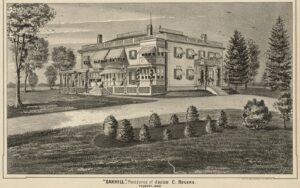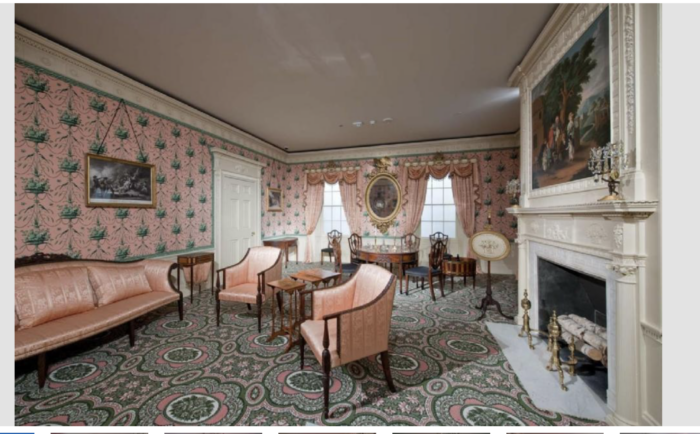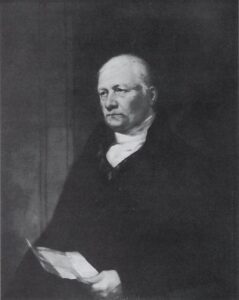
On November 19, 1806, the Supreme Judicial Court of Massachusetts declared the matrimonial bonds of Elizabeth Derby West and Nathaniel West to be dissolved on grounds of Nathaniel’s adulterous activities. Elizabeth charged these acts took place both before and after the new divorce law passed on March 7, 1806. The court disagreed, ruling that evidence for West’s adulterous activities after that date was not satisfactory.
The remaining issue was one of property. If the new law only applied to offenses after it became law, West only owed his wife one-third of her property. But, if it applied to offenses before the law was passed, he owed her much more compensation.
Elizabeth’s lawyers argued the new law was a continuation of existing law, which meant she was entitled to more than one-third of her property. Nathaniel’s lawyers contended the new law had no bearing on the case, because Nathaniel’s misconduct predated it. The Court ruled the 1806 law applied to divorces granted after the law took effect, regardless of when the adultery occurred. Elizabeth was two for two when the parties negotiated a private settlement.

Elizabeth West received the farm of Oak Hill in Danvers, $3000 per year in alimony, plus funds to provide for the children still at home. The older children may have chosen to live with their father. In 1806, Martha was nineteen years old. Nathaniel, Jr., age eighteen, attended Harvard, and was involved in his father’s business. Elizabeth was sixteen years old. The two younger children, Edward, age twelve, and Sarah, age nine, initially remained with their mother.
The court of public opinion ruled against Elizabeth West. According to William Bentley, most people thought “the court laid too much stress upon an affair upon which [her] father laid none & which the wife did not resent for twenty years. That the wife has proved herself capable of the utmost malignity, that Gen. Derby [her brother] has contrived a law & aided a malicious prosecution to gratify his enmity to West & to possess & injure his property, & that although West is blameworthy, yet, that his behavior has been so much more honorable than of his opposers that he finds new testimonies of public favor.”

On March 10, 1814 at the age of 52, Elizabeth Derby West died at Oak Hill. Bentley noted that at her funeral the next day “The body was brought from her farm in Danvers in the Danvers hearse, followed by seven coaches & chaises. No one but the relatives attended excepting a minister” One wonders who traveled in the seven coaches.
In her will, Elizabeth provided for her eldest son, gave various specific items to named recipients, and divided Oak Hill between her three daughters, “and it is my express will that in no case they transfer the said estate to their father, Capt. Nathaniel West.”
So, what happened to Oak Hill?
Three months after Elizabeth’s death, on June 25th, Nathaniel West married Julia Houghton. The couple had a son, Richard, in 1818.
In 1819, Nathaniel’s youngest daughter Sarah died of consumption. She bequeathed her share of Oak Hill to her father. In December 1820, Nathaniel arranged to cut four rooms off the mansion and move them by ox-drawn sleds from the farm in Danvers to his house at 34 Chestnut Street in Salem. Nathaniel made the new rooms the core of a new Federal-style mansion. The work was completed in 1824.
Nathaniel’s middle daughter Elizabeth married Capt. Edward Lander in 1813. Perhaps following her sister’s example, Elizabeth, through her husband, deeded her interest in Oak Hill to her father in 1826. In 1840, Martha deeded the last third of the estate to Nathaniel.

In 1850, Nathaniel sold Oak Hill to Elizabeth Leavitt Pickman Rogers. In 1922 the Rogers family sold the property. Mrs. Jacob Crowninshield Rogers donated the dining room, a bedroom, and the parlor from Oak Hill to the Boston Fine Arts Museum. The restored collection is now on display in the museum’s Art of the America’s Wing.

Captain Nathaniel West put the events of 1806 behind him. He continued his successful career as an investor and merchant, and died at the age of 96 on December 19, 1851 with an estate was valued at $168,248, the equivalent of several million dollars today.
Nathaniel’s obituary as quoted in The Ships & Sailors of Old Salem describes a man who successfully transitioned from the age of merchant ships and privateers to one of railroad investments.
His age so nearly approximated a hundred years that we may say he flourished during four generations of his race, in the most active and enterprising walks of life. In person, Capt West was of a fine figure, and majestic mien and gait. He never forgot the dignity which belonged to his years and station. He was a gentleman of the old school in manners and dress and adhered with scrupulous tenacity to the costume of his early years. His physical powers were so little impaired, even in his extreme old age, that he was frequently seen driving along in his gig, or walking with vigorous and elastic step, until a very short time before his death … he united in himself personal frugality, economy, and untiring industry; and his favorite maxim was “without these none can be rich, and with these few would be poor.”
⚓️⚓️⚓️
Illustrations
Elizabeth Derby West
Oak Hill
Hauptfriedhof Karlsruhe; Engelsskulptur von Fidel Binz by Axel Mauruszat.
Oak Hill Parlor
Nathaniel West
Oak Hill Parlor, Boston Museum of Fine Arts.
West v. West. Superior Judicial Court of Massachusetts. EWS.SJC.1806. West
Phillips House (1821) Historic New England.
Dudley Atkins Tying, Esq. Reports of Cases Argued and Determined in the Supreme Judicial Court of the Commonwealth of Massachusetts, vol II, from March 1806 to June 1807. Boston: Little Brown & Company. 1853. Pp 223-226
Jim McAllister. “Essex County Chronicles: Rooms from the Peabody Estate a Signature Feature of new MFA Wing.” The Salem News. Apr 18, 2011.
Harry Irwin West. Descendants of Henry West.

Sandra Wagner-Wright holds the doctoral degree in history and taught women’s and global history at the University of Hawai`i. Sandra travels for her research, most recently to Salem, Massachusetts, the setting of her new Salem Stories series. She also enjoys traveling for new experiences. Recent trips include Antarctica and a river cruise on the Rhine from Amsterdam to Basel.
Sandra particularly likes writing about strong women who make a difference. She lives in Hilo, Hawai`i with her family and writes a blog relating to history, travel, and the idiosyncrasies of life.

